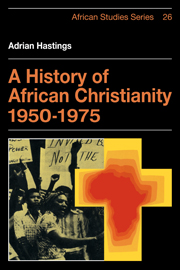Summary
Church and State
The first week of 1959 saw a major riot in Leopoldville with several hundred deaths, which rocked the Congo and precipitated it at a blow into the frontline of change. Feeding on urban unemployment, the volatile new parties had suddenly posed a challenge to Belgium which no one had the heart to resist for long with any vigour. The French and British examples could not safely be ignored any more: just across the river in Brazzaville that amiably flamboyant priest-politician, Fulbert Youlou, was already prime minister. A complex Congolese political world had suddenly emerged, wholly inexperienced, wholly resolved on acquiring power with the minimum of delay. On one side stood Joseph Kasavubu of ABAKO, a former seminarian, appealing for the revival of the ancient tribal kingdom of the Congo within a weak federation, a charismatic figure into whom – according to lower Congo rumour of 1959 – Simon Kimbangu's own spirit had ‘entered’. Next year when, just before independence, Kimbangu's body was solemnly brought back from Elizabethville, Kasavubu would be there at the ceremony. On the other side stood Patrice Lumumba of the Mouvement National Congolais, committed to a non-tribal nationalism and a unitary state, the electrifying demagogue of the new society. Lumumba's return from the Accra Conference heightened the tension which produced the January riots, signalling the start of eighteen months of frenetic political activity: party-making, constitution-making, government-making for the greatest state of Central Africa.
The following month Dr Banda's return from the same meeting had a similar effect in Nyasaland: ‘To Hell with federation,’ he cried, ‘Let us fill their prisons with our thousands, singing Hallelujah.’
- Type
- Chapter
- Information
- A History of African Christianity 1950–1975 , pp. 131 - 183Publisher: Cambridge University PressPrint publication year: 1979

